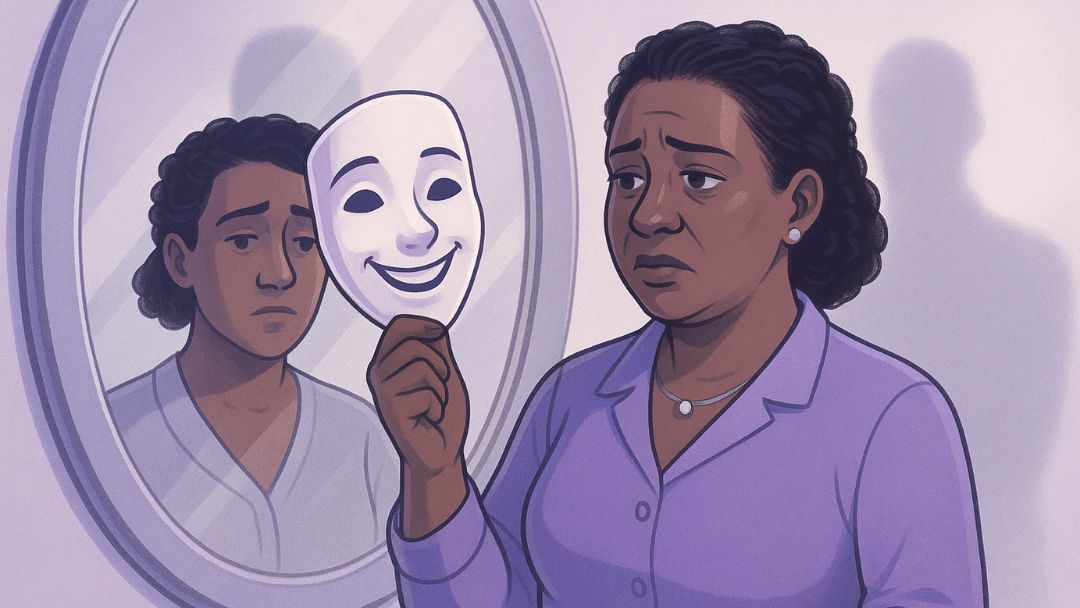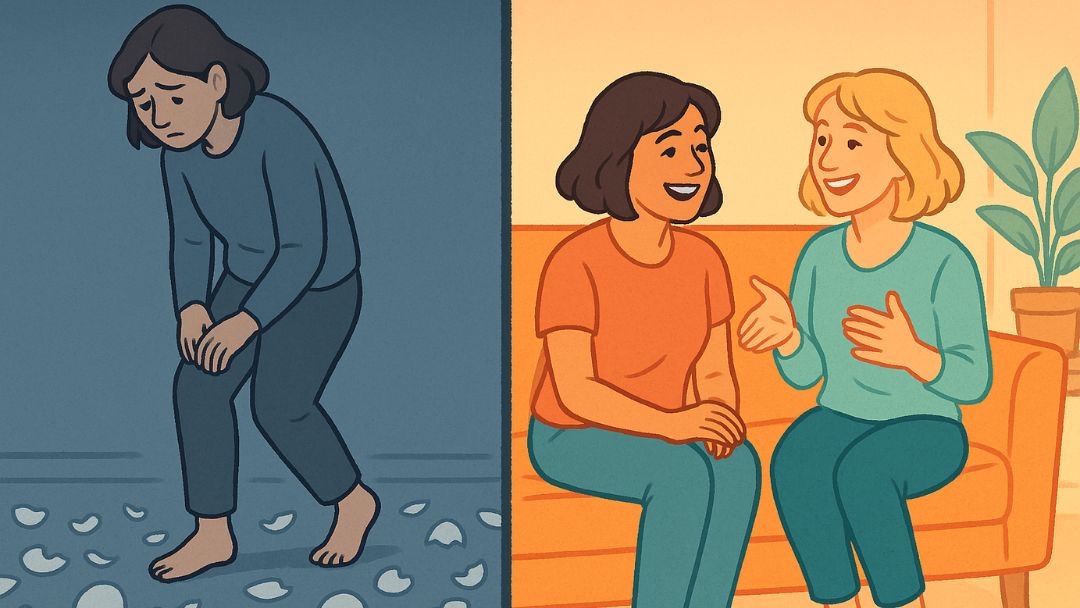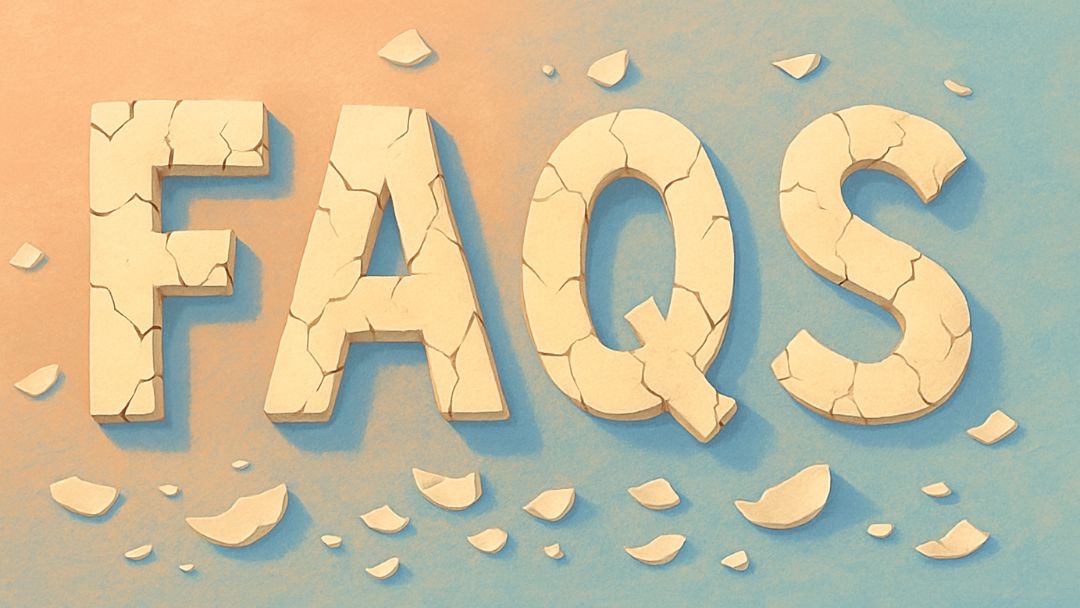Walking on Eggshells in a Relationship? Here’s How to Break Free Without Losing Yourself
Always watching what you say to avoid upsetting someone close to you? That constant tension could be a sign of emotional abuse. Learn the signs of walking on eggshells—and how to reclaim your peace, confidence, and voice.


Back
7 mins read
Growing up, I was afraid of my dad—we all were. The moment he called my name, I’d think, “What did I do now?” You always had to check yourself, just in case you'd done something wrong.
Even on the rare occasions when we were allowed to laugh, I had to make sure we were on the same page. Otherwise, he might stop mid-joke and bring up something I’d done.
I constantly monitored my words and actions to avoid making him angry. He was like a detective, always searching for mistakes. Living with him meant walking on eggshells—literally.
Have you ever been in a situation where you had to carefully watch what you said or did to avoid upsetting someone? It happens more often than we realize—not just in romantic relationships, but also with toxic friends, family members, even coworkers or managers. People like this are everywhere.
Living this way is emotionally exhausting. It chips away at your confidence, your voice, and your sense of safety. You might even start to think you're the problem. If you could just say the right thing—or be a little more careful—maybe things would stay calm. But that’s not true; it's a sign of an unhealthy relationship.
In this article, we’ll break down what it really means to “walk on eggshells,” the signs that you might be stuck in that dynamic, and—most importantly—how to start breaking free. You deserve to live, speak, and exist without fear.
Recommended: Red Flags in Women and Red Flags in Men
What Does Walking on Eggshells Mean?

Imagine walking across a floor covered in fragile eggs. You’d move slowly, carefully, afraid that even the smallest misstep could cause a mess.
Now picture living that way emotionally—where every word, every action feels like it could crack something. That’s what it means to “walk on eggshells” in a relationship.
When you are walking on eggshells, you're constantly watching what you say or do to avoid upsetting someone. This person—whether it’s a partner, parent, boss, or friend—may be unpredictable, quick to anger, or prone to shutting down. You try to keep the peace by managing their moods and avoiding anything that might set them off.
For example, imagine working under a supervisor who flies off the handle easily. You choose your words carefully, steer clear of certain topics, and second-guess yourself before speaking up—just to avoid triggering a reaction. That constant tension? That’s walking on eggshells.
Related: How to Break Up with Someone You Love
7 Signs You're Walking on Eggshells in Your Relationship

At first, it might seem normal to tiptoe around someone’s moods now and then. We all hold back occasionally—choosing not to bring something up or waiting for a better time. But when this becomes your default mode, it’s a red flag.
Walking on eggshells isn't about thoughtful timing. It's about fear—fear of setting someone off, fear of rejection, or fear of emotional backlash. You start adjusting everything you say or do, just to keep the peace. And over time, you might not even notice you’re doing it.
Here are some common signs that you’re stuck in this kind of dynamic:
1. You Overthink Everything You Say
You replay conversations in your head before they even happen. You choose your words carefully, worrying they’ll be taken the wrong way. Sometimes you stop mid-sentence to rephrase—just to avoid upsetting them.
2. You Constantly Monitor Their Mood
You’re always reading the room. A sigh, a look, a pause—it’s enough to put you on high alert. You scan their face, their tone, their body language. Did you do something wrong? Should you apologize, even if you're not sure for what? You brace yourself for angry outbursts and mood swings that sometimes come out of nowhere.
3. You Blame Yourself for Their Reactions
When they lash out, shut down, or go cold, your first instinct is to wonder what you did. Even when a part of you knows it’s not really your fault, you still take on the responsibility—and try harder to keep things calm next time.
4. You Avoid Certain Topics
There are things you simply don’t bring up. Not because they don’t matter, but because you’ve learned they’ll cause tension, criticism, or emotional shutdowns. So when something hurts or bothers you, you say you're fine—even when you’re not.
5. You Feel Anxious Around Them
You feel your body tense up when they enter the room. The mood shifts, and so do you. Even if nothing’s wrong yet, you’re already bracing for something to go wrong.
6. You Struggle to Share What You Need
You swallow your needs because speaking up doesn’t feel safe. Maybe you’ve been called dramatic or sensitive before. So now, you stay quiet—hoping it’ll keep the peace.
7. You Leave Interactions Feeling Drained
After spending time together, you don’t feel supported or connected—you feel wiped out. Like you’ve been walking on a tightrope the whole time. And it’s exhausting, and that stress can lead to depression.
Walking on Eggshells vs. Healthy Relationships: What’s Really Going On

Walking on eggshells isn’t just about avoiding conflict. It’s about constantly managing someone else’s emotions—until their reactions start to dictate your every move.
Over time, that kind of caution can start to feel normal, especially if you’ve lived with it for a long time. But it’s not. It’s a sign that something in the relationship is unbalanced.
People often fall into this pattern for reasons that go deep:
- Fear of conflict or retaliation. You’ve learned that speaking up might lead to arguments, silent treatment, or angry outbursts—so you stay quiet instead.
- A desire to keep the peace. The other person is unpredictable, and tiptoeing feels like the only way to maintain calm.
- Past trauma or conditioning. Maybe you grew up in a home where love was conditional—where being “good” or quiet was how you stayed safe. Those attachment patterns don’t just disappear.
- Low self-worth. If you believe your feelings don’t matter, you’re more likely to stay silent than risk being called dramatic or too sensitive.
- Power imbalance. In some relationships—romantic, familial, or even professional—one person holds more control, making it feel unsafe to be fully honest.
In contrast, healthy relationships don’t run on fear or silence.
You don’t have to second-guess every word or manage someone else’s emotions just to keep the peace. You can disagree without punishment. You can be honest, even when things are hard. And most importantly, you still feel respected, supported, and safe being yourself.
If you're not sure what a healthy dynamic should include, it may help to reflect on your relationship non-negotiables—the core boundaries and values you shouldn't have to compromise to feel safe and seen.
How to Stop Walking on Eggshells

Realizing you’ve been walking on eggshells is a powerful first step. But what comes next can feel overwhelming—especially if you’ve spent years adapting to someone else’s moods just to feel safe. The truth is, you don’t have to live this way. Bit by bit, you can start to reclaim your voice, your confidence, and your emotional safety.
Here are some compassionate, practical steps you can take to begin that process:
Communicate with Your Partner
This applies if the person you're dealing with was once kind and communicative—but something shifted. Maybe they’re overwhelmed, facing work pressure, or going through a tough time.
While it’s important to give them space to cope, it’s just as important to express how their behavior is impacting the way you interact. Choose a calm moment to share how you're feeling. If they respond with empathy and a willingness to change, you can start working together to rebuild trust and balance.
Set Clear Boundaries
If communication doesn't go well—or if it feels unsafe—setting healthy boundaries is essential to protect your well-being. You have every right to say:
- "I'm not comfortable with that."
- "Let's talk about this when we're both calm."
- "I need space right now."
Start small, and be consistent. People who are used to controlling the emotional temperature may resist, but holding your boundaries is an act of self-protection—not selfishness.
Seek Support
You don’t have to go through this alone. A trusted friend, therapist, or support group can help you make sense of what you're experiencing—and remind you that you deserve to feel safe and supported.
If your pattern of walking on eggshells started in childhood, you may not even realize how deeply conditioned it’s become. Therapy can help you understand where it comes from and how to shift it.
Create a Safe Inner World
Even when no one else notices, walking on eggshells can keep your body in a constant state of alert. Healing means learning to listen to yourself again—and to trust that your feelings matter.
Notice what triggers your anxiety. Journal without judgment. Practice self-compassion. Reconnect with your needs and preferences, even in small ways. You don’t have to fix everything at once. Just take the next right step.
And above all, remember: it’s not your fault.
Know When It’s Time to Get Out
If you’re being threatened, manipulated, or harmed—emotionally, verbally, or physically—know that you don’t owe anyone your silence. Abuse is never your fault. You deserve safety, respect, and freedom.
If you’re in danger or need someone to talk to, the National Domestic Violence Hotline is available 24/7 at 1-800-799-7233 or via chat at thehotline.org. They can help you make a plan and find support—even if you’re not sure what to do yet.
You Deserve to Feel Safe—In Every Relationship

Relationships are supposed to offer comfort—not confusion, tension, or fear. But when you're constantly on edge around someone, it doesn’t just hurt your peace of mind—it can start to affect every part of your life.
If you’ve been feeling numb, unmotivated, disconnected from joy, or like you're always tired no matter how much you rest—those can be signs of depression. And sometimes, they don’t come from within you, but from the emotional toll your environment takes on your mental health.
You deserve better. You deserve to feel calm in your own skin. To speak without fear. To be your full self without worrying that it’s too much or not enough.
Whatever your situation looks like—whether it’s just starting to feel off or it’s been heavy for a long time—know this: the cycle you’re in can be easily broken. Healing is possible. Support is real. And most importantly, none of this is your fault.
You don’t have to keep shrinking to make someone else comfortable. You deserve to feel safe, connected, and free.
Frequently Asked Questions About Walking on Eggshells

We’ve covered a lot in this article—emotionally and practically. But if you’re still sorting through your thoughts or just want a quick, clear recap, these are some of the most common questions people ask when they realize they might be walking on eggshells.
What does it mean to walk on eggshells in a relationship?
Walking on eggshells means constantly monitoring your words, tone, or behavior to avoid triggering someone’s anger, criticism, or mood shifts. It creates emotional tension and fear, often leaving you feeling anxious and unseen.
What are the signs you're walking on eggshells?
Common signs include overthinking what you say, avoiding certain topics, blaming yourself for their reactions, feeling anxious around them, and emotionally shutting down to keep the peace.
Is walking on eggshells a sign of emotional abuse?
It can be. While not all difficult dynamics are abusive, chronic emotional tension, fear of speaking up, and self-silencing to avoid backlash often point to emotionally abusive patterns.
Why do I feel like I have to walk on eggshells around someone?
This feeling often comes from fear of conflict, past trauma, low self-worth, or being in a relationship with someone who is emotionally volatile or controlling. It’s a survival strategy that may have deep roots.
How do I stop walking on egg shells?
Begin by recognizing the pattern and understanding it’s not your fault. From there, you can work on setting boundaries, seeking support, reconnecting with your voice, and—if needed—getting help from a therapist to build emotional safety and self-trust.


Return to Blog





